|
The Street
Plaxtol
01732 810407
http://papermakersarms.com/
https://whatpub.com/papermakers-arms
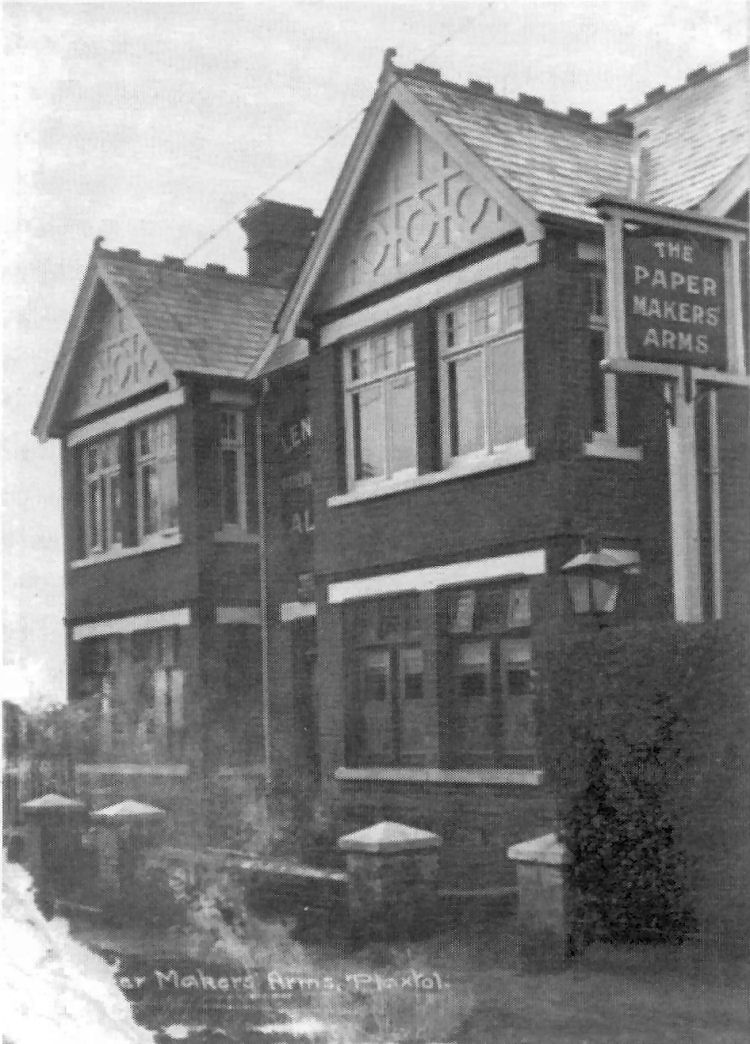
Above postcard, date unknown. |
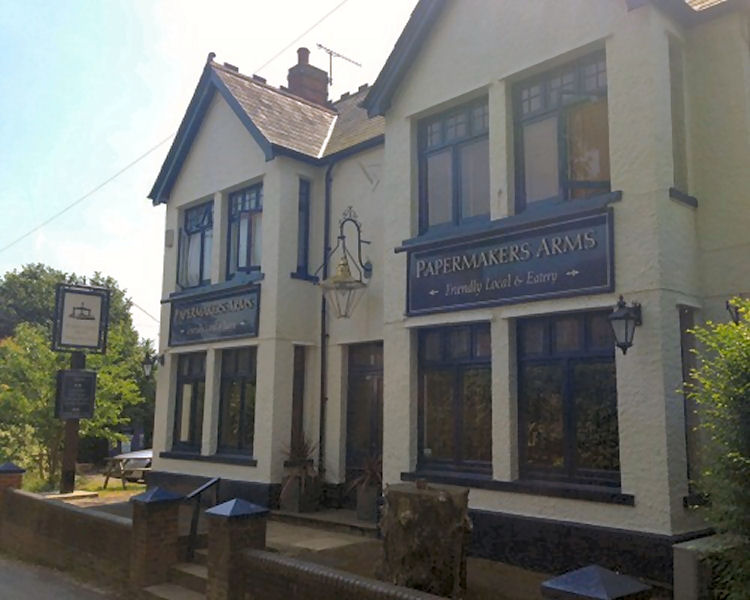
Above photo 2015. |
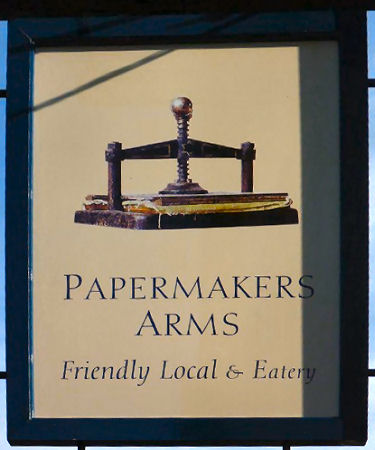
Above sign 2015. |
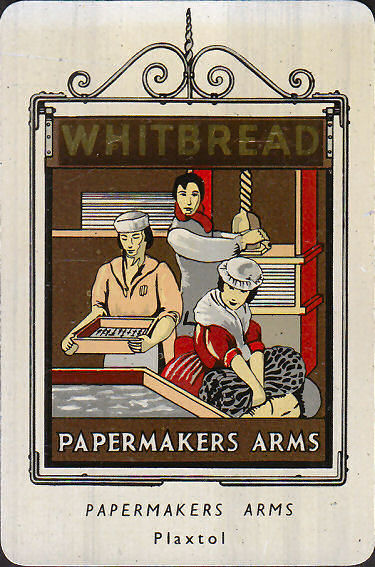 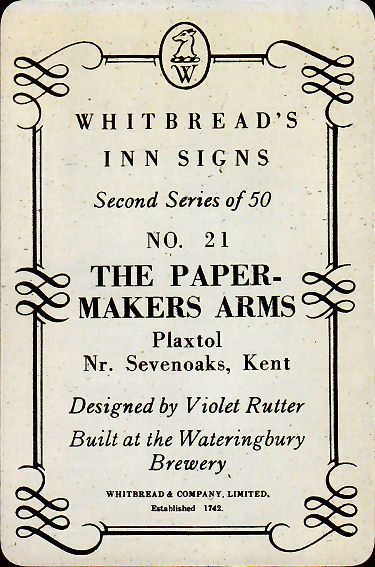
Above aluminium card issued 1950. Sign series 2 number 21.
|
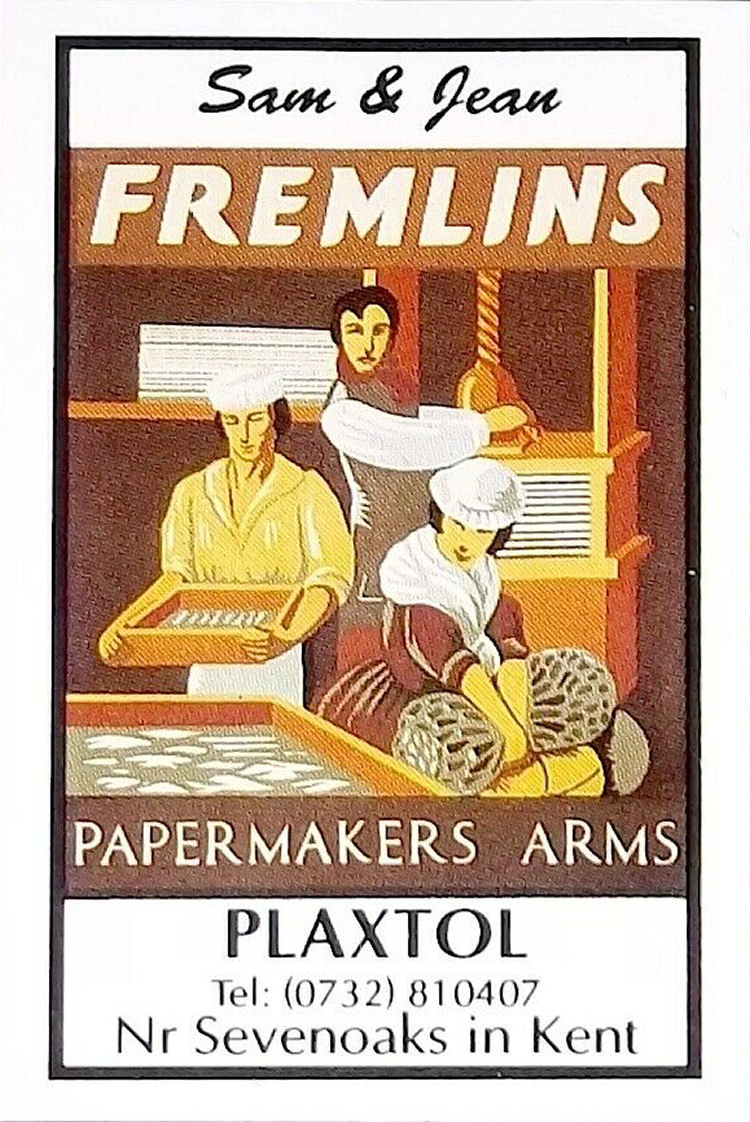
Above matchbox, date unknown, kindly sent by Debi Birkin. |
|
Maidstone Journal and Kentish Advertiser – Tuesday 10 September 1889
THE HOPPER BRIGADE.
Wm. Barton and Henry Larner were charged with
being drunk and
disorderly, at Shipbourne, on the 2nd September.
P.C. Potter, about nine o’clock in the evening, was summoned to the
“Rifleman,” Dunk’s Green. There
he found the prisoners, and twenty other people, drunk, wanting to
fight, and using very disgusting
language. He heard Barton make use of threats, and one of the men said
he would set fire to the house
if he was not supplied with drink. Witness requested them to leave, but
they refused to do so, and he
had to eject them. On getting outside, Barton struck him in the chest,
the effects of which he had felt
ever since. He endeavoured to persuade them to go away, whereupon Jones
hit him on the shoulder,
and Larner caught hold of his arm, pulled him round, and struck him.
Barton spat in his face, and in a
scuffle witnesses’ tunic was torn or cut. The constable went for
assistance and on his return found the
prisoners and several of their friends had decamped and he subsequently
found them in the
“Papermaker’s Arms,” at Plaxtol. From here he ejected them, and as they
continued obstreperous and
would not go away, took them into custody.
Mrs. Jane Trice, wife of the landlord of the "Rifleman," corroborated the
Constable’s evidence to a certain
extent. The prisoners threatened her and after they were ejected said
they would burn the house down.
Her husband had kept the house for eight years and these were the
roughest lot that they had had to
deal with.
Wm. Thomas, gardener, of Puttenden said he saw some of the prisoners
with their shirts off, making a
disturbance, and what the constable had to deal out was perfectly
correct.
Superintendent Barnes said the men were down for the hopping but refused
to work on Tuesday. They
went from one public house to another to kick up a row, and their
conduct was most disgraceful.
The Bench considered it a very bad case and sentenced each of the
prisoners to 21 days’ hard labour
without the option of a fine.
|
|
From the Tunbridge Wells Courier, 20 July, 1898.
TO BREWERS. GROCERS, AND OTHERS. PLAXTOL, KENT.
Sale of an Old-established Beer house, Grocer's and Draper's shop and
cottage.
Mr. W. R. TOMPSETT is favoured with instructions to sell at auction, at
the "Rose and Crown Hotel," Tonbridge, on Tuesday, July 26th, 1898, at
Three o'clock in the Afternoon, in two Lots, all that VALUABLE FREEHOLD
PROPERTY, comprising the old-established BEERHOUSE, known as "THE
PAPERMAKERS ARMS,"
Situate in Plaxtol Village, and THE GROCER'S AND DRAPER'S SHOP and
Residence, with COTTAGE and FRUIT PLANTATION adjoining.
The Beerhouse and premises are let on lease (expiring Michaelmas, 1899),
to Messrs. F. Leney and Sons (Limited), at the inadequate rental of £25
per annum.
The Shop and Residence, with Cottage and Fruit Plantation, are let to Mr
Frederick Coomber, on a yearly tenancy at £30 per annum.
NOTE - This property it situate in the middle of an important hop and
fruit district near to the celebrated Roughway Paper Mills, the locality
through which the proposed Light Railway passes; this line will tend to
develop the neighbourhood, and give greater facilities for the extension
of the trade.
May be viewed by permission of the tenants.
Particulars and Conditions may be obtained at the place of sale; "Star"
and "Queen’s Head Hotel," Maidstone; of Mr. E. B Harris, Solicitor,
Tonbridge, and at the Auctioneer's Offices, Tonbridge, and Stone Castle
Farm, Paddock Wood.
Postal Address - Tonbridge.
|
|
Sevenoaks Chronicle and Kentish Advertiser 14 January 1938.
PLAXTOL MAN KILLED IN ROAD CRASH.
While on a visit to relatives at Eveltham, near Basingstoke, Mr. Albert
Edmund Killmaster, aged 27 years, of the "Papermaker's Arms," Plaxtol,
was killed while motor cycling there on Sunday afternoon. Mr. Killmaster
had made an adjustment to his machine and it was while he was testing it
out that the accident occurred.
He had served in the Oxford and Bucks Light Infantry for seven years and
on leaving the service a year ago he came to live with Mr. and Mrs. C.
T. Rabbitt, his brother-in-law and sister, of the "Papermaker's Arms." Mr. Killmaster was employed at Short's aeroplane works at Rochester as a
fitter, motor cycling from Plaxtol to and from his work.
(Charles T. Rabbitt married Mary Killmaster, between Oct. & Dec. 1921
at Maidenhead, Berkshire 2c 1145).
|
|
Sevenoaks Chronicle and Kentish Advertiser 09 September 1938.
PLAXTOL ALTERATIONS.
The Malling Justices on Monday approved alterations to the "Papermaker's Arms."
|
|
Plaxtol Local History Group, Ed. Mollie Lewis, Plaxtol Within Living Memory, 1994.
Betty Davey Remembers.
Betty, a member of Plaxtol Local History Group, is the daughter of
Charles and Mary Rabbitt, one-time proprietors of the Papermakers' Arms.
After she married Jo Davey, whom she met in her A.T.S. days during the
war, they came to live in Shields Cottages where they brought up their
two sons — a tight fit at times — and Betty is still there. Her father
had bought all four of Shields Cottages for just under £1,000 in 1948.
Joe Davey will be remembered for the great support he gave to Plaxtol
Cricket Club, to which he was treasurer for many years. Betty has worked
at Plaxtol School in many capacities since 1961. She has written for us
some of her early memories of days at the village inn.
My family moved from Tonbridge to Plaxtol in the early 1930s and spent
the next almost 20 years in the Papermakers' Arms. I can still remember
the price of beer, which stayed the same for years. Mild was 4d. a pint,
bitter 6d. a pint and old was 8d. a pint. Food was not often served, but
the man who delivered the lemonade would talk at length and for years
after eating it about the boiled bacon and broad beans he had had on one
occasion at the Paper-makers' Arms. Mum would cook for darts' suppers
and similar functions, always large amounts of rabbit stew. The cabbage
or sprouts would be cooked in the copper meant for boiling washing. It
had to be fed with wood in the fire, quite a small space, under the
boiler, which was also used for heating water for baths.
Sometimes a man would bring in a large swede or some cherries or some
other treat, and Dad would give him a pint, thinking he was probably a
bit short of cash — there wasn't much of it about in those days. Once
Tom Gunner brought in a lamb. I don't know if its mother had died or
couldn't feed it. We — the four kids — would prepare its bottle by
putting a red hot poker in a jug of milk. When it stopped hissing it was
ready — I don't know what a modern vet would think about that! Larry
(although she was a ewe lamb she had to be Larry because Toy Town was so
popular on Children's Hour on the wireless) thrived, and used to come
for walks with us on a lead. Of course she had to go back to the flock
eventually, and, although I never asked, I expect to the butcher in the
end. Country children were usually matter-of-fact about such things —
they were part of life. Life in the pub got a lot more lively at
hop-picking time. The hop pickers from East London seemed almost like
another race, so lively and rather free with their language — Mum didn't
approve! My sister and I would lean out of the bedroom window to watch
them at their high jinks. At the weekends friends and family would come
to visit the pickers, and before going home on Sunday evening would ask
for a bunch of 'flahrs' to take back to London. I was sent to the garden
and allowed to keep the 6d. paid for each bunch. Riches!
We had very little pocket money but I remember going to Mr. Thorpe's
shop at Dunks Green which sold other things than bread and cakes. There
were 'art' silk stockings at 10^d. a pair, rather a nasty orange sort of
colour, but worn inside out were not too bad, and were all we could
afford.
Every Saturday evening two farm workers from Old Soar Cottages (one was
called Mr. Christmas) would come into the bar and hand over shopping
bags. Dad would fill the bags with the regular order of bottles of beer,
Vimto, chocolate, crisps and tobacco. At closing time the men would pay
from a large wad of notes (where did all that money come from, we
wondered?) for all to see, take their bags and set off across the fields
past the hopper huts to the cottages at Old Soar. There was never any
trouble. Would it be so safe today?
|
|
From the
http://www.bbc.co.uk 20 November 2010.
Plaxtol residents refurbish Papermakers Arms in a week
The pub has been completely refurbished in a week, with local
residents donating time, skills and money.
A Kent pub is reopening for business after villagers gave it a
facelift in just one week to prevent its closure.
The "Papermakers Arms," in Plaxtol, near Tonbridge, was put on the
market last month because of dwindling profits and fewer customers,
dismaying residents.
Landlady June Edmondson said: "The pub itself just got tired and with
no money to spare there's nothing you can do about that."
More than 100 residents donated their time and money to refurbish the
pub.
They were encouraged to take action by resident Eileen Dickinson.
She said: "I've lived here for 20 years, and in that 20 years I've
seen seven businesses disappear, and I wasn't prepared to sit back and
let this happen again."
She added she decided to muster up as much support as possible, and
120 people came forward. |
LICENSEE LIST
STEVENS Alexander 1871+ (age 68 in 1871 ) )
CLARKE John 1881+ (age 36 in 1881 ) )
PETHURST Robert 1911+ (age 59 in 1911 ) )
GRIMWOOD Henry J to Nov/1921

WHITMAIL Henry Nov/1921+

EDMONDSON June 2010+
 Census Census
 Sevenoaks Chronicle and Kentish Advertiser Sevenoaks Chronicle and Kentish Advertiser
|





